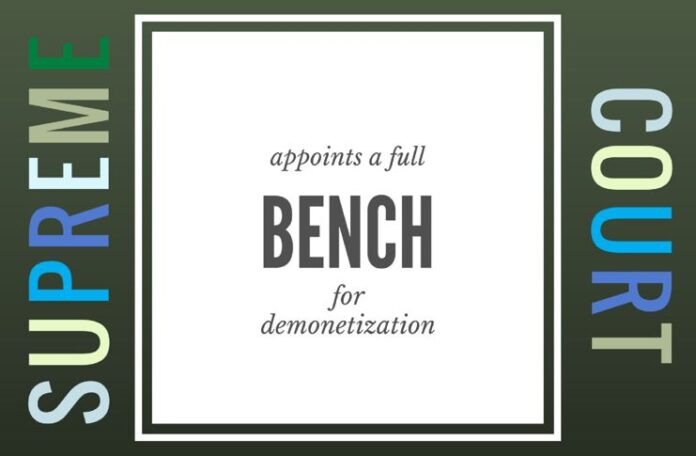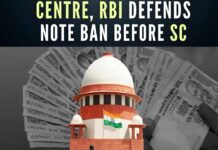
[dropcap color=”#008040″ boxed=”yes” boxed_radius=”8px” class=”” id=””]I[/dropcap]t would be an excellent example of the saying “Closing the stable door after the horse has fled”. It also may well be a topmost leader takes on the responsibility of a sensitive and tricky national issue only to later pass it on to his underlings.
This may well be the outgoing CJI Thakur’s idea of giving his parting kick to the Modi government in return for its alleged delay in appointing judges to the various High Courts and the Supreme Court.
On December 18, a three-judge bench of the Supreme Court headed by the Chief Justice of India (CJI) refused to issue any order on a batch of petitions that challenged the Government of India’s November 8 decision to demonetize Rs.500 and Rs.1000 notes. Instead, it transferred all the petitions (lying before it for a while) to a five-judge Constitution Bench to be set up by the new CJI who will take over from January 3. This may well be the outgoing CJI Thakur’s idea of giving his parting kick to the Modi government in return for its alleged delay in appointing judges to the various High Courts and the Supreme Court.
Forgotten, or deliberately overlooked, by the above decision was that, on 9th August 1994, when Thakur J. was a permanent judge of the Karnataka High Court, a five-judge Constitution Court had upheld the validity of High Denomination Bank Notes (Demonetization ) Act, 1978, which had been challenged by a bunch of petitions principally on the alleged violation of
(a)Article 14 relating to equality before law, (b) Article 19(i)(g) related to fundamental right to carry out trade and commerce and (c) Article 300(A) relating to the fundamental right to property. The detailed judgement is at https://indiankanoon.org/doc/1199635/
[dropcap color=”#008040″ boxed=”yes” boxed_radius=”8px” class=”” id=””]T[/dropcap]his time around, the proposed Constitution Bench has been given such a wide angle of scrutiny of 9 groups of issues including Constitutional provisions that, going by current standards, it might deliver its verdict after several years. By then, the present demonetization scheme will have become history. And the horse would surely have fled from the stable — maybe even for posterity if the Apex Court advocates modifications and Rules in the Reserve Bank of India Act, 1934, as would be unacceptable encroachment on the RBI’s inherent powers to a self-respecting Central Government.
Persons shall not be deprived of property save by authority of law.
It all depends on what the Constitution Bench finds in that wide angle of the group of 9 issues which have been dumped in its lap. Condensed below are those 9 issues with the Constitution Articles concerned being described for the reader’s ready information:
(i) Whether the Notification of November 8 is ultra vires of Sections 26(2), 7,17, 23, 24, 24, 29 and 42 of the Reserve Bank of India Act, 1934.
(ii) Whether that Notification contravenes the provisions of Article 300 (A) (“Persons shall not be deprived of property save by authority of law.”)
(iii) Whether that Notification, if validly issued, is ultra vires of Article 14 (“Equality before law.”) and 19 (“All citizens shall have the right to practice any profession, or to carry on any occupation, trade or business.”).
(iv) Whether the limit of withdrawal on withdrawal of cash from the funds deposited in bank accounts has no basis in law and violates Articles 14, 19 and 21 (“No person shall be deprived of his life and property except according to procedure established by law.”).
(v) Whether the implementation of the said Notification(s) suffer from procedural and/substantive unreasonableness and thereby violates Articles 14 and 19, and if so, to what effect?
(vi) Even if held permissible, does Section 26(2) of the RBI Act, 1934 suffer from excessive delegation of legislative power, thereby rendering it ultra vires of the Constitution?
(vii) What is the scope of judicial review in matters relating to fiscal and economic policy of the Government?
(viii) Whether a political party’s petition on the issues raised is maintainable under Article 32 (“Remedies for enforcement of (fundamental) rights conferred …”), and
(ix) Whether District Co-operative Banks have been discriminated against by excluding them from accepting deposits and exchanging demonetized notes.
[dropcap color=”#008040″ boxed=”yes” boxed_radius=”8px” class=”” id=””]C[/dropcap]ontrasting the High Denomination Bank Notes Demonetization event of January 1978 with the present one, a Policy Researcher has said that “The failure to… provide the legal basis for the demonetization notification this time renders the exercise illegal.”
The 1978 episode was really a specific one-off event which later got transformed into a Law of the country.
In this context, let it be noted that the High Denomination Bank Notes (Demonetization ) Act, 1978 (a law passed by Parliament on 30th March 1978) was preceded, over two months earlier, by an Ordinance promulgated by the President and which had come into force on January 16, 1978. It was not based on Section 26(2) of the RBI Act, 1934 under which the recommendation of the RBI’s Central Board of Directors gets converted into a Gazette of India Notification by the Central Government; that is what was done for the existing Notification of November 8, 2016. The 1978 episode was really a specific one-off event which later got transformed into a Law of the country. And Section 26(2) is a law on its own under the Reserve Bank of India Act, 1934 (as modified up to February 28, 2009).
Reverting to the framework of 9 issues, two interesting verdicts of the Apex Court were highlighted on 21 November 2016 by an article posted on Live Law.in at http://www.livelaw.in/legitimacy-of-demonetization/# by one Dr.Yogesh Pratap Singh, an Associate Professor of Law at National Law University, Odisha, and currently on deputation as Deputy Registrar, Supreme Court of India.
What Dr Singh did was to cite two illuminating Supreme Court verdicts having a bearing on the court challenge to the present demonetization.
The first verdict is on the Balco Employees’ Union (Regd.) vs. Union of India and Ors. 2002(2) SCC 333. Paras 92 and 93 therein go as follows:
In a democracy, it is the prerogative of each elected Government to follow its own policy. Often, a change in Government may result in the shift in focus or change in economic policies. Any such change may result in adversely affecting some vested interests. Unless any illegality is committed in the execution of the policy or the same is contrary to law or mala fide, a decision bringing about change cannot per se be interfered with by the court. Wisdom and advisability of economic policies are ordinarily not amenable to judicial review unless it can be demonstrated that the policy is contrary to any statutory provision or the Constitution. In other words, it is not for the courts to consider relative merits of different economic policies and consider whether a wiser or better one can be evolved.
Secondly, says Dr Singh, “In catena of other cases (Peerless General Finance and Investment Co. Ltd. v. RBI, (1992) 2 SCC 343; Pallavi Refectories v. Singareni Collieries Co. Ltd., (2005) 2 SCC 227) the court has dithered to indulge itself with the executive and the legislative domains.”
[dropcap color=”#008040″ boxed=”yes” boxed_radius=”8px” class=”” id=””]T[/dropcap]hus, he concludes, unless policy is clearly illegal or unconstitutional, the courts should not intervene. Those, remember, are the words of a Deputy Registrar of the Supreme Court of India. Hear, hear, M’Lord Thakur.
Another dissent is on the RBI refusing the District Co-operative Banks to accept/exchange the demonetised Notes.
However, apart from a morality perspective, some basic misconceptions need clarification. Firstly, a tweet says that while Section 26 (2) of the RBI Act, 1934. does provide for cessation of legal tender of certain Bank Notes, the November 8 Notification of the RBI did not mention “the series” of the demonetised Notes as stipulated by Section 26(2). This impression is based on not carefully reading the RBI Press Release of 8th November 2016 which, in its first sentence stated that “Government of India vide their Notification no. 2652 dated November 8, 2016 have withdrawn the Legal Tender status of Rs.500 and Rs.1,000 denominations of banknotes of the Mahatma Gandhi Series issued by the Reserve Bank of India till November 8, 2016.” (https://rbi.org.in/Scripts/BS_PressReleaseDisplay.aspx?prid=38520)
Another dissent is on the RBI refusing the District Co-operative Banks to accept/exchange the demonetised Notes. Overlooked here is that the mentioned Banks are officially listed in the RBI’s Second Schedule (forming a part of its 1934 Act) which denies some facilities to the mentioned Banks because of their certain deficiencies of infrastructure etc. Yes, the Pawars and the Thackerays can cry hoarse over the issue, but the law is the law.
One more comment seems necessary. Once the cessation of legal tender for the above two denomination Notes has been legally justified, it seems trivial for the proposed Constitution Court to seek a dissection of the RBI Act ‘s other Sections such as 7(Management), 17 (Business), 23(Issue Department), 24 (Denomination of Notes), 29 (Bank exemption from stamp duty on Bank notes), and 42 (Cash Reserves) — all of which are included in the first of the 9 groups which is its given framework.
Finally, along with the above triviality, there is the tragedy.
[dropcap color=”#008040″ boxed=”yes” boxed_radius=”8px” class=”” id=””]T[/dropcap]he tragedy is that, in framing the 9 issues, the Supreme Court appears to have overlooked a critical Section of the Reserve Bank Act, 1934 as it stood up to February 28, 2009.
That Section is numbered as 58A. Protection of action taken in good faith. And it says
“(1) No suit, prosecution or other legal proceeding shall lie against the Central Government or the Bank or any other person in respect of anything which is in good faith done or intended to be done under this Act or in pursuance of any order, regulation or direction made or given thereunder.”
“(2) No suit or other legal proceeding shall lie against the Central Government or the Bank for any damage caused or likely to be caused by anything which is in good faith done or intended to be done under this Act or in pursuance of any order, regulation or direction made or given thereunder.”
(https://rbidocs.rbi.org.in/rdocs/Publications/PDFs/RBIAM_230609.pdf)
The present demonetization was in fact done to root out (i) counterfeit Notes, (ii) corruption, (iii) black money and (iv) terrorism — all embodied in the RBI Press Release of November 8, 2016, and all embodying “good faith” right?
- To Editors’ Guild; May we also have our say… please? - July 17, 2019
- Farooq Sahab is either down with dementia or he is a congenital liar? - July 8, 2019
- Shah Bano, Muslims in gutter &Zakaria’s secularism - June 30, 2019











First of all the constitution itself is too old & too often tampered by the elected lot most of them ignorant of many realities which hurt the common man who voted him/her. Even assuming they knew it , they were help less to air it or act on it as the same foolish law would disqualify them as AN ELECTED MEMBER against THE WILL OF THE PEOPLE. Time & again the courts interfered with people elected rulers too often relying on such out dated constitution which was never referred as a “referendum” in 62 years to the people of so called democratic India , which should have been & be done every time along with the general elections in the country in a true democracy if it is to be “of the people, for the people & By the people” as democracy is defined.& Not “of the elected, for the elected & by the elected” as it is against the true desire of the people. By electing any body, the people have given only limited authority to the elected, as declared by the manifesto of the elected & not a blanket authority to rip the people themselves ! Our out dated statute not approved by people’s referendum even once in 62 years after its coming into force full of colonial law like loop holes and escape routes for the accused especially the VIP ones, against the true intrinsic equality before law for the people. This is the main reason for delayed Jammed up justice to the people with cries of cases pending in various courts. We should bear in mind the judges are appointed lot say by any system & are not elected by the people from among the brilliant lawyers who should mandatorily participate to such top posts. This itself is a case against true democracy of the people the intrinsic merit being over ruled ! I am not against any reservations please note. Now we have 2 big issues before the country preventing the true intrinsic well being of the people of India.
1. Providing a dynamic statute (Constitution) without loop holes,which is to be referred to the people on every general election, where in every party & participant stating what change he/she would do on his/ her election to the statute, which the winning party can enforce on its election w/o any voting in the 2 houses as it is directly approved as referendum & self determination by the people who are above the elected lot & judges for one term. till the next general election of referendum. the centre to have its statute for defence & foreign affairs &inter state dispute resolving only, & every state to have its own statute, Apex court & lower courts within the sovereignity of the Nation.This preserves the autonomy status, culture of individual state. I know no where it exists, but some one has to set good example for other herds to follow like Newton’s law of motion was not revealed before by any one else other than by Issac Newton even though the phenomenon existed from the beginning of the world.
2. the people elected judges from among top eminent lawyers , should confine them selves to the people approved Statute only, & even if the rulers are wrong, they should return back for correction rather than Over ruling the people elected rulers for a term. creating chaos in the country with every constitutional body clashing in the open & spreading anarchy nicely fanned up by all Media including Social media.
W/o these steps no country can boast of the well being of its citizens though they will keep running as usual, as time & tide waits for no one.
@ Luty read my reply to crook like youthe ?Raj . Tell me your age & public memory quotient before commenting filth! IF Modi desrves a kick you traitor likes deserve gallows.
Dr. Singh’s article on live law is misleading one. Plz see the 1978 Act is enactment passed by the Parliament. Whereas present notification has no such value. More over the RBI Act is very clear on this issue. It provides demonetization of some series of notes only. Dr. Singh did not clarify this issue. He quoted from the relevant section partly. Following him is noteworthy, I believe. Or let him clarify this first.
Plz note one thing that the 1978 Act is an enactment passed by the Parliament. So, unless the law is against the basic tenets of the Constitution it cannot be discarded by the Court. But in the matter of present notification, it is not law. Moreover the RBI Act is very clear that only particular denominations can be demonetized by the Govt, the rest of the posers go to the Parliament. Dr Sing in his article on live law utterly and to some extent dishonesty failed to explain anything on this issue. His article is only a misleading one. Don’t follow it. Otherwise ask him to clarify it.
“Moreover the RBI Act is very clear that only particular denominations can be demonetized by the Govt, the rest of the posers go to the Parliament.”
The above part in my comment may be re-read as “Moreover the RBI Act is very clear that only particular series of notes can be demonetized by the Govt, the rest of the part go to the Parliament.”
Delivering a parting kick means closing the door on rehabilitation package too.
Whatever modi does turns into failure, mark my words he will finally resort to and depend on polarization in 2019 elections….. because that is something that bhakts are masters at…
How have you judged? who are you? you are only 1/ 120crore to judge this b Beware! the country has run scam free for the last 4years as against last 66years of high level corruption. The blackies are caught! They are sitting with idle black money despite cunning conversion of black money in to so called white in currency or gold unable to use them. So the country now running w/o parallel economy suffers, which is the price for ruining the country with black money for 66years! One of the reasons for 60 or so Rs to a US $ now as against Rs. 4.25 to a US $ in 1956. you stupids were not even born then!
Modi govt deserves this kick..They have goofed up everything to do with economy, law, handling corruption, black money at the behest of crook like Jaitley. Modi needs to remember that Vajpayee lost 2004 election because he let crook like Brajesh Mishra do all the nonsense